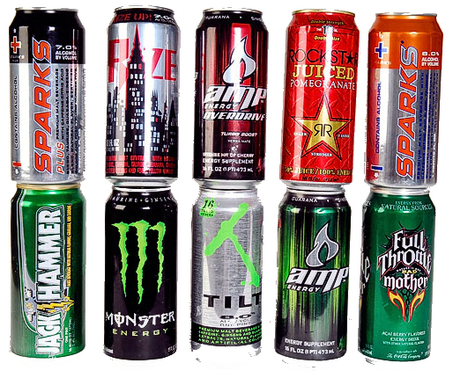
Growing up, I never drank energy drinks because my mom would always yell at my dad for drinking 5 Hour Energy, going on and on about how bad they are for him. Now that I’m in college, however, I’ve started drinking Starbucks Doubleshot Energy Drinks to help me stay alert enough to get my homework done on top of studying, going to class, working, and eating a meal at some point. But every time I crack one open, I can hear my mother’s voice in the back of my head. This made me wonder what is specifically bad about energy drinks, so I decided to do a little research and find out.
Energy drinks are sold as nutritional supplements. Because of this, the FDA does not regulate or limit the ingredients put in these drinks. This makes it very possible that we may not know what we are truly ingesting when we drink these products (Koelliker para. 3). That’s a scary thought. Even soda has a limit as to how much caffeine can be in it, and the ingredients are printed right on the can.
Many people tend to forget that caffeine is a psychoactive drug. Too much of it can cause headaches, tremors, heart palpitations, and nausea. At even higher levels, it can cause seizures, mania, hallucinations, and strokes (Schumaker para. 4).
Minors are especially prone to taking part in this new energy drink phenomenon. Since they don’t (or shouldn’t) have access to alcohol or other kinds of drugs, energy drinks are a fun, cheap, and easy way to get wound up and have fun. This is especially dangerous because “high levels of caffeine have been associated with harmful neurologic and cardiovascular effects in children, and drinks containing stimulants should never be given for hydration or as a supplement to young persons” (Koelliker para. 9). Even The American Academy of Pediatrics recommends that energy drinks should never be consumed by children or adolescents (Koelliker para. 8), and yet there’s no age limit.
Energy drink-related visits to the emergency room have nearly doubled between 2007 and 2011, and about 80% of adults in the US consume caffeine daily (Schumaker). These startling facts should be proof enough that energy drinks are a huge problem affecting a large portion of our population. If energy drinks were regulated like soda is, they wouldn’t be nearly as dangerous as they are. However, until that changes, energy drinks should be something we all avoid if possible. They have dangerous amounts of caffeine and other unknown ingredients in them, and can cause some pretty horrible side effects. I guess my mom was right, energy drinks are bad.
Works Cited:
Koelliker, Diana, MD. “Just How Bad Are Energy Drinks?” Telluride Medial Center. N.p., n.d. Web. 22 Oct. 2014. <http://tellmed.org/patient-information/local-health-concerns-1/just-how-bad-are-energy-drinks>.
Schumaker, Erin. “Just How Dangerous Are Energy Drinks, Anyway?” The Huffington Post. TheHuffingtonPost.com, 23 June 2014. Web. 20 Oct. 2014. <http://www.huffingtonpost.com/2014/06/23/just-how-dangerous-are-energy-drinks_n_5515647.html>.
